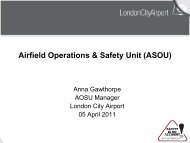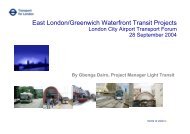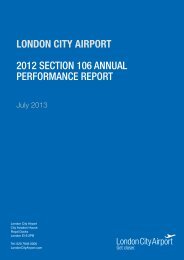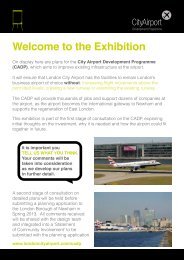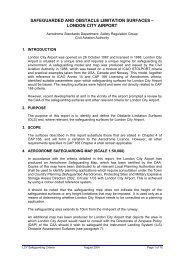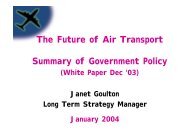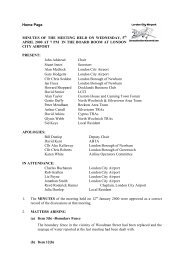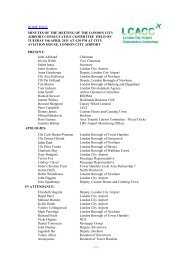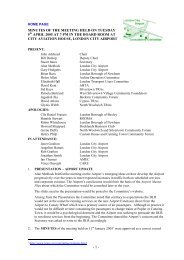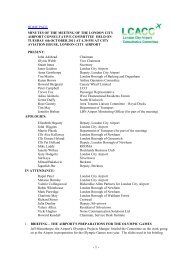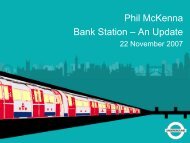The Mayor's Ambient Noise Strategy - Greater London Authority
The Mayor's Ambient Noise Strategy - Greater London Authority
The Mayor's Ambient Noise Strategy - Greater London Authority
Create successful ePaper yourself
Turn your PDF publications into a flip-book with our unique Google optimized e-Paper software.
88 Mayor of <strong>London</strong><br />
<strong>The</strong> Mayor’s <strong>Ambient</strong> <strong>Noise</strong> <strong>Strategy</strong><br />
Taxis and private hire vehicles<br />
4A.62 <strong>The</strong> Mayor’s Transport <strong>Strategy</strong> recognises that licensed taxis (‘black<br />
cabs’) and private hire vehicles (‘minicabs’) make an important<br />
contribution to overall transport needs in <strong>London</strong>, especially providing<br />
door to door services late at night. Some 21,500 licensed taxis operate in<br />
<strong>London</strong>, mostly in Central <strong>London</strong> and around Heathrow Airport. Over<br />
24,000 taxi drivers are licensed. <strong>The</strong>y undertake about 85 million taxi trips<br />
a year. In <strong>Greater</strong> <strong>London</strong> taxis account for some 2% of all kilometres<br />
travelled by road vehicles. In Central <strong>London</strong> they account for 14% of<br />
kilometres driven. Licensed taxis and their drivers are regulated for quality<br />
by the Public Carriage Office, now part of Transport for <strong>London</strong>. <strong>The</strong> usual<br />
maximum operating life of a taxi is 15 years. Over the last decade, the<br />
average number of new licensed taxis entering the fleet is around 1,000<br />
per year. As of July 2003, only 0.8% of the taxi fleet (165 taxis) were<br />
over 15 years old.<br />
4A.63 <strong>The</strong> recognisable rattle of older diesel-engined taxis has been one of the<br />
distinctive sounds of <strong>London</strong>. Older diesel taxis can be noticeable in<br />
quieter streets, particularly outside busy periods. However, newer taxis are<br />
becoming quieter, and older taxis are being replaced. Gas engines are<br />
often quieter than diesel. <strong>The</strong> Mayor’s Air Quality <strong>Strategy</strong> (Proposal 18)<br />
seeks to ensure that taxis with older (and noisier) engines will be either<br />
replaced by modern vehicles or modernised with quieter engines. It states<br />
(Air Quality <strong>Strategy</strong>, paragraph 4D.39) that Transport for <strong>London</strong> will<br />
work with the taxi trade to increase the number and improve the quality<br />
of taxi ranks. Location and design need to take account of the need to<br />
minimise local noise impact. Transport for <strong>London</strong> intends to implement a<br />
taxi emissions reduction strategy, which, with changes in engine<br />
technology used by taxi manufacturers, will help to reduce noise.<br />
4A.64 It is estimated that there are between 35,000 and 40,000 minicab drivers<br />
operating in <strong>London</strong>, mostly outside the centre, undertaking some 70<br />
million trips a year. Private hire operator, driver and vehicle licensing is<br />
being introduced, under the Private Hire Vehicles (<strong>London</strong>) Act 1998. <strong>The</strong><br />
sector has hitherto been unlicensed in <strong>London</strong>. Licensing is proceeding -<br />
first operators, then drivers and vehicles. Whilst the primary concern is<br />
safety, this should also reduce some of the local noise problems<br />
associated with ‘touting’ around venues, alongside other public order and<br />
safety issues. Licensing should also encourage better maintenance of<br />
vehicles, with some benefit for noise.<br />
4A.65 Transport for <strong>London</strong> seeks to build consensus on major issues facing both<br />
taxis and minicabs. Account should be taken, as far as possible, of noise<br />
from customers waiting and disembarking, as well as from vehicles. TfL also



